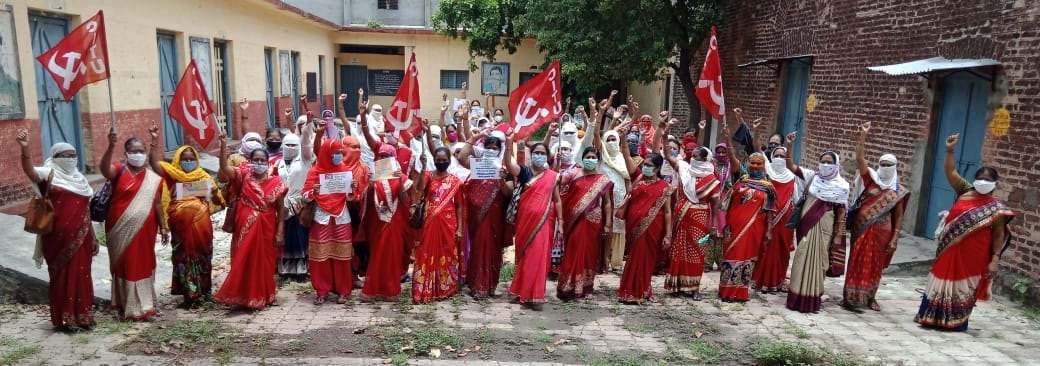
A R Sindhu
THE scheme workers all over the country went on a two day strike on August 7-8, 2020. As per reports, lakhs of scheme workers working under various central schemes delivering basic services – National Health Mission (NHM), Integrated Child Development Services (ICDS), Mid Day Meal Scheme (MDM) and Sarva Siksha Abhiyan (SSA), went on strike in the states of Assam, Andhra Pradesh, Bihar, Chhattisgarh, Delhi, Gujarat, Haryana, Himachal Pradesh, Jammu & Kashmir, Jharkhand, Karnataka, Kerala, Madhya Pradesh, Maharashtra, Odisha, Punjab, Tamil Nadu, Telangana, Uttar Pradesh, Uttarakhand and West Bengal.
In spite of threats of termination by the authorities and of arrest by the police, the scheme workers, mostly women, and especially the anganwadi and ASHA workers, came out on the streets defying the government. In many states, the contract workers working in the health sector also joined the strike. In a couple of states where the Covid situation is grave, the ASHA and anganwadi workers joined duty wearing black badges.
The call for strike given by the joint platform of scheme workers’ unions and federations affiliated to the central trade unions was supported by the trade unions of all sectors and also by the peasant organisations. It is welcome that in many places, recognising the importance of the services by these workers, beneficiaries and family members expressed solidarity with the strike and joined the dharna/demonstrations.
The very serious situation prevailing in the country in which the lives of the frontline health workers especially the ASHA, NHM and anganwadi workers are at stake has forced the central trade unions to call for this two-day strike on August 7-8. The government is not providing any safety equipment to these ‘corona warriors’ while assigning them duties of door-to-door visit and monitoring of the infected people. Scores of ASHA and anganwadi workers have died doing Covid-19 duty, but did not get any compensation or insurance. Hundreds of them are getting infected daily due to the lack of safety gear. Wages of the scheme workers which itself is a pittance, are pending in most of the states for even up to six months. The mid-day meal workers are going without any wage (which is only Rs 1,000 per month) since lockdown. So, the main demands of this strike consist of timely payment of remuneration, risk allowance of Rs 10,000 per month, compensation of Rs10 lakh for infection and proper safety gear to all on Covid duty.
In most of the states, on the first day, the workers held demonstrations and gave memorandum to the authorities at the block level and on the second day, they held demonstrations at the village level. The struggle also got support and publicity from a major section of the media as well. The scheme workers have also joined in large numbers in the countrywide jail bharo/satyagraha on August 9, 2020, called by the central trade unions and supported by the peasant organisations against the anti-people anti-national policies of the BJP led NDA government.
CITU demanded that the government should immediately provide necessary safety measures and a risk allowance to the frontline scheme workers and increase the allocation for the basic services’ schemes. The national platform of scheme workers federations and unions is planning to step up their struggles for safeguarding the lives and livelihoods of the workers.
The scheme workers have been in joint struggles for a decade on the basic demands of making the centrally sponsored schemes like ICDS, NHM and MDMS permanent with adequate budget allocation and withdrawal of the proposals for privatisation of basic services including health (including hospitals), nutrition (including ICDS and MDMS) and education and implementation of the recommendations of 45th and 46th ILC for regularisation of scheme workers as workers; paying minimum wages Rs 21,000 per month and pension Rs 10,000 per month.
One must recall that the initiative taken by the CITU to develop the coordination between the scheme workers’ organisations working in different schemes has developed into a powerful movement and has seen some of the biggest mobilisations in the recent past. The mahapadav of scheme workers in 2012 organised by the CITU has resulted in the 45th ILC recommendations in 2013. The all India strike of scheme workers was first initiated by the CITU in January 2017 and it was developed as a joint platform and in the three-day mahapadav in New Delhi by the central trade unions, more than a lakh scheme workers were mobilised at Jantar Mantar on the last day. The scheme workers joint strike in January 2018 witnessed one of the biggest mobilisations of women workers in every district of the country. Apart from getting the acknowledgement of their contribution to the society by the public, these struggles could stop the Modi government from closing down or privatising the schemes and forced the central as well as the state governments to improve their working conditions.


